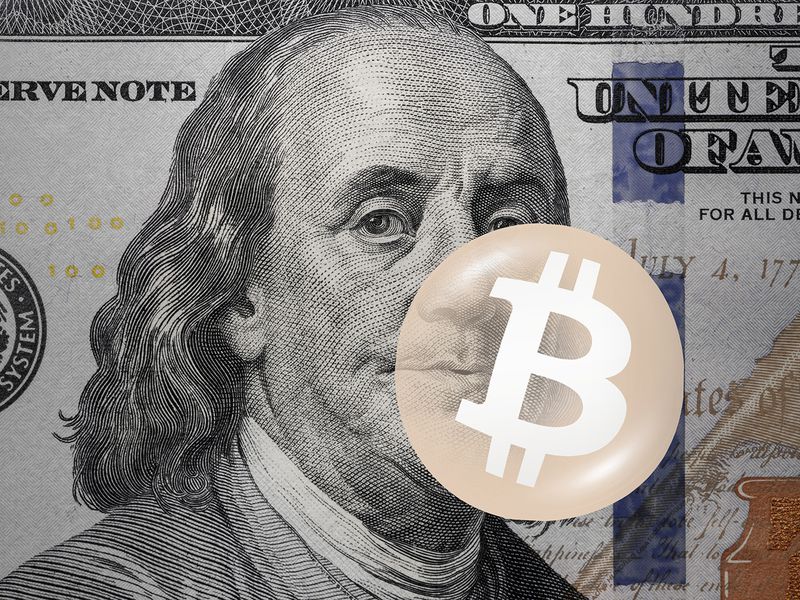First Mover: A Bullish ($1 Million) Bitcoin Forecast as Year of Ox Begins
ByteTree’s Charlie Morris shows how bitcoin’s price gets to $1 million by 2032. PLUS: JPMorgan hounded by own traders over absence in bitcoin market.

First Mover: A Bullish ($1 Million) Bitcoin Forecast as Year of Ox Begins
Editor’s Note: Happy Chinese Lunar New Year! First Mover will not publish on Monday, February 15, which is Presidents’ Day in the U.S. Cryptocurrency markets will be open, as they always are.
Price Point
Bitcoin (BTC) was lower, after pushing early Friday to a new all-time high price of $48,925, based on CoinDesk pricing.
Market activity was quiet due to the Lunar New Year celebrations across Asia and the upcoming Presidents’ Day holiday in the U.S. on Monday, according to Craig Erlam, senior market analyst for the foreign-exchange brokerage Oanda. (It’s the Year of the Ox, by the way, which is seen by some traders as bullish, in case you missed the story last week by CoinDesk’s Muyao Shen.)
In traditional markets, U.S. stock futures were lower, with one investor telling Bloomberg News that “investor exuberance has somewhat waned.” Gold weakened 0.5% to $1,817 an ounce.
The News
JPMORGAN FEELS BITCOIN BURN: JPMorgan employees hounded senior trading-division management during an internal “town hall” meeting over when the largest U.S. bank might get into bitcoin, CNBC reported.
RESERVE CURRENCY STATUS? ECB President Christine Lagarde said it’s “very unlikely” that central banks will hold bitcoin in the near future. “I would say it’s out of the question,” Lagarde said during a conference call hosted by The Economist.
GIVE THE PEOPLE WHAT THEY WANT: U.S. Securities and Exchange Commissioner Hester Peirce, sometimes known as “Crypto Mom” due to her sanguine views on the digital-asset industry, said the country’s capital markets are ready for a bitcoin exchange-traded product. The SEC has refused to approve a bitcoin exchange-traded fund despite multiple applications. People are already eager to trade a bitcoin ETP, “so if we don’t give them the natural way, which I think would be an ETP, they are going to look for other (less optimal) ways to do it,” Peirce said Thursday on CoinDesk TV.
CANADA ISN’T WAITING: The first North American bitcoin ETF was approved Thursday by the Ontario Securities Commission. “Perhaps they’re normal and SEC too conservative,” tweeted Eric Balchunas, senior ETF analyst at Bloomberg. “Either way U.S. usually follows shortly after.”
FINANCE EXECS DEMUR ON BITCOIN: Top financial executives at Verizon, Cisco Systems and Mozilla see risks and accounting challenges in putting corporate money into bitcoin, the Wall Street Journal reported. Such anecdotes challenge the investment narrative that the cryptocurrency is set to benefit from a wave of new demand from companies.
BAIR’S A BEAR: Bitcoin prices are at “nosebleed levels,” said Sheila Bair, former chair of the U.S. Federal Deposit Insurance Corp. and now chair at the government-owned mortgage-finance company Fannie Mae. “Stay away from it,” she said late Wednesday in a Bloomberg Radio interview. “It’s volatile. It’s at nosebleed levels now. We don’t know how sustainable that is.”
INDIA GRACE PERIOD: Policymakers in India will provide a transition period if a proposed ban on cryptocurrency usage is passed as expected, Bloomberg reported. After that, cryptocurrency usage in all aspects will be banned via a new law set to be introduced in the current parliamentary session via the Cryptocurrency and Regulation of Official Digital Currency Bill, 2021.
Market Moves
How bitcoin gets to $1 million in 11 years, in one analyst’s scenario
First Mover ran some back-of-the-envelope math earlier this week to illustrate just how scarce the supply of bitcoin might be for the bevy of new institutional investors and corporate treasurers now ostensibly considering an allocation to the cryptocurrency, following Tesla’s announcement earlier this week of a $1.5 billion purchase.
Now comes Charlie Morris, chief investment officer of ByteTree Asset Management, who has run his own calculations along similar lines, making First Mover’s amateur efforts look like the doodlings of a toddler.
Some 363,500 bitcoins will be awarded this year to cryptocurrency miners for helping to secure the blockchain network, Morris estimates. He assumes the miners “will presumably sell most because that is their business.”
Further extrapolation leads to a figure of $18.17 billion: This is the amount of new bitcoin demand that would be needed this year to “sustain a $50,000 BTC price,” according to Morris.
For context, Morris writes that gold exchange-traded funds attracted $41 billion last year. “Given the offsetting flows into bitcoin at the time, the evidence points towards gold investors switching into bitcoin,” Morris writes: “If bitcoin can attract $41 billion in 2021, as gold did last year, expect to see an average bitcoin price of $100K.”
It’s pretty bullish, in other words, but not crazily farfetched. As First Mover reported earlier this week, some $2.02 billion has already flowed into bitcoin-focused investment products this year, based on a report Tuesday from the digital-asset manager CoinShares. And the CoinShares report doesn’t even cover demand from investors or corporate treasurers who may be buying bitcoin directly through their own accounts, or purchases from retail traders who are looking for a piece of the action.
Factor in the Bitcoin blockchain’s quadrennial halvings, where miner rewards are cut in half, and the investment hurdle gets lower every four years. “It keeps on falling thereafter, meaning that high prices are easier to sustain in the future than today,” Morris writes.
So what does that mean for bitcoin prices? Morris figures a $1 million price for bitcoin is reasonable by 2044 at a rate of $41 billion of new inflows per year. If consumer price inflation averages 2.5%, the $1 million mark is achieved by 2036, or by 2032 if inflation averages 5%. That’s just 11 years from now, representing a 20-fold gain from current price levels.
Mastercard/BNY Mellon Reax
Gavin Smith, CEO, Panxora Group: “BNY Mellon’s and Mastercard’s entry into the cryptocurrency space moves bitcoin two huge steps closer to mainstream acceptance.”
David Mercer, CEO, LMAX Group: “Financial institutions are now preparing to follow their clients.”
Don Guo, CEO, Broctagon Fintech Group: “We hope that the increasing adoption will urge the industry to prioritize liquidity provision through improving crypto infrastructure. This will ensure both existing and new participants consistently have access to the best prices and that the industry reaches the next level of maturity.”
Edward Moya, senior market analyst, Oanda: “Improved mainstream acceptance for cryptocurrencies are completely easing most regulatory concerns for now.”
Anthony Pompliano, Morgan Creek Digital, in a tweet: “Eventually, every company will join the revolution.”
Bitcoin Watch
Number of large bitcoin addresses swells, CoinDesk’s Omkar Godbole writes

Bitcoin’s blockchain data supports the popular narrative that price rally has been fueled by increased institutional demand.
- According to data source CoinMetrics, the number of bitcoins locked in the addresses holding between 1,000 to 10,000 BTC has increased significantly since late 2020. The group now holds over $5 million coins or 30% of bitcoins’ total supply. That’s a sign of increased participation by high net worth individuals and institutions.
- Retailers too have participated in the rally, with addresses holding between 0 and 10 BTC gaining share since mid-2020.
Token Watch
Ether (ETH): Joel Kruger, cryptocurrency strategist at exchange LMAX Digital, offered CoinDesk’s Muyao Shen some price points to watch: “A break above [$1,840] will open the door for a test of massive resistance at $2,000, which represents a critical psychological barrier and measured move upside extension,” Kruger said. “We see the first level of support at $1,680, with a break below to take the immediate pressure off the topside and open the door for a correction back down towards the $1,500 area.”
Avalanche (AVAX): Network comes to near halt after “bug in the cross-chain functionality” fails under high loads, according to Avalanche developer team on Reddit. The AVAX token’s price has jumped 15-fold already this year.
Tether (USDT): Dollar-linked stablecoin’s market cap surpasses $30B.
Economy in Transition
REMOTE WORKING STICKS: Another year of remote working looms as companies delay office-reopening plans to September or beyond, in many cases refusing to commit to specific dates, the Wall Street Journal reports. As First Mover wrote in November: “A secular transition to commuting-by-Internet might be taking place, perhaps one of the biggest labor-force transformations since the industrial revolution, which lured people to cities…. Governments and central banks are probably going to have to provide a lot of aid and stimulus to assure the transition goes smoothly, that society holds together, that people can manage.”
U.S. DEBT > 100% OF GDP: The government’s debt load is on track to exceed the size of the entire U.S. economy this year, largely due to the $4 trillion in emergency spending approved since March to fight the pandemic and stimulate output. The debt is forecast to reach 107% of gross domestic product in a decade.

Opinions and Observations
PAY NOW OR PAY LATER: Mohamed El-Erian, chief economic advisor for the German financial behemoth Allianz, writes in column for Bloomberg Opinion: “What is favorable for policy and markets now increases future risks, starting with financial instability. The more Wall Street surges ahead in the short term, the harder it is for eventually improving economic conditions to validate the ever more elevated asset prices in an orderly manner.”










